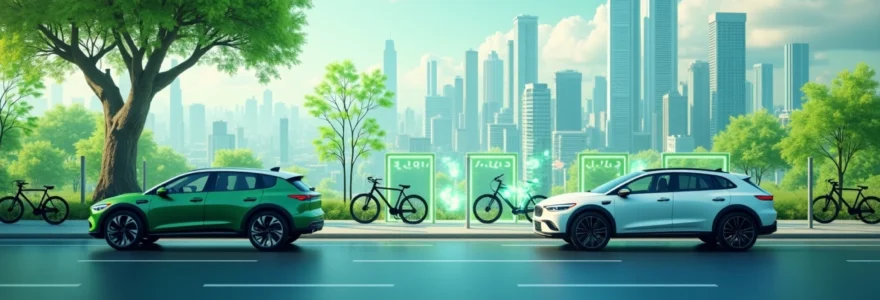As environmental consciousness continues to grow, travelers are increasingly seeking ways to reduce their carbon footprint without compromising on convenience. Eco-friendly car rental options have emerged as a significant solution, offering sustainable alternatives for those who want to explore new destinations responsibly. From electric vehicles to hybrid cars and innovative sharing programs, the travel industry is adapting to meet the demands of environmentally-minded tourists.
These green initiatives not only help preserve our planet but also often provide cost-effective and efficient travel experiences. By choosing eco-friendly transportation, travelers can enjoy the freedom of personal mobility while minimizing their impact on local environments and contributing to global sustainability efforts.
Electric vehicle rental companies prioritizing sustainability
Leading the charge in sustainable travel are car rental companies that have invested heavily in electric vehicle (EV) fleets. These forward-thinking businesses are revolutionizing the industry by offering travelers access to cutting-edge, zero-emission vehicles that combine environmental responsibility with technological innovation.
Zero-emission fleets reducing carbon footprint
Electric vehicle rental fleets are making significant strides in reducing the travel industry's carbon footprint. By offering EVs as a primary rental option, these companies are enabling travelers to dramatically cut their emissions during their journeys. The impact is substantial - a typical electric car produces about 50% less greenhouse gas emissions than the average gasoline-powered vehicle over its lifetime.
Moreover, as electricity grids increasingly incorporate renewable energy sources, the environmental benefits of EVs continue to grow. Travelers can now explore destinations with the peace of mind that comes from knowing their transportation choice is actively contributing to cleaner air and reduced climate impact.
Charging infrastructure supporting clean energy
To support the transition to electric vehicles, rental companies are investing in robust charging infrastructure. This network of charging stations is crucial for the success of EV rentals, providing travelers with the confidence to embark on longer journeys without range anxiety.
Many companies are partnering with hotels, attractions, and city planners to install charging points at key locations. This infrastructure development not only benefits rental customers but also contributes to the broader adoption of electric vehicles by locals and visitors alike. For example, if you're planning a trip to the Pacific Northwest, you can click here to explore EV rental options in Seattle, a city known for its extensive charging network.
Eco-conscious practices throughout rental process
Electric vehicle rental companies are implementing eco-conscious practices beyond just offering zero-emission cars. Many are adopting paperless transactions, using sustainable cleaning products, and implementing water conservation measures in their vehicle maintenance processes. These holistic approaches to sustainability ensure that the entire rental experience aligns with environmentally responsible principles.
By choosing an electric vehicle rental, travelers are not just reducing emissions - they're supporting a comprehensive ecosystem of sustainable practices designed to minimize environmental impact at every turn.
Hybrid car options for Environmentally-Minded travelers
While fully electric vehicles are at the forefront of eco-friendly travel, hybrid cars offer a compelling alternative for those seeking a balance between sustainability and flexibility. Hybrid vehicles combine a gasoline engine with an electric motor, providing significant fuel efficiency improvements over traditional cars while offering the range and refueling convenience that some travelers prefer.
Rental companies are expanding their hybrid offerings to cater to this market segment. These vehicles are particularly appealing for longer trips or in areas where EV charging infrastructure may be less developed. Hybrid rentals allow environmentally-conscious travelers to reduce their carbon footprint without compromising on the ability to cover long distances or venture into more remote areas.
The fuel efficiency of hybrid cars can result in substantial savings on fuel costs, making them an attractive option for budget-conscious travelers as well. Many hybrid models now achieve fuel economies of over 50 miles per gallon, significantly reducing both emissions and expenses on long road trips.
Bike sharing programs in major cities
For urban explorers, bike sharing programs have emerged as an excellent eco-friendly alternative to traditional car rentals. These programs are becoming increasingly prevalent in major cities worldwide, offering visitors a sustainable and often more convenient way to navigate urban environments.
Convenient access to urban attractions
Bike sharing stations are strategically located throughout cities, often near popular tourist attractions, transit hubs, and business districts. This network allows travelers to easily pick up and drop off bikes as needed, providing unparalleled flexibility for sightseeing and short trips. Many cities have integrated these programs with public transportation systems, creating seamless multimodal travel options for visitors.
Cost-effective alternative to traditional rentals
Compared to car rentals or taxis, bike sharing programs offer a highly cost-effective transportation solution for urban travelers. Most programs offer various pricing options, from single-ride fares to multi-day passes, catering to different travel needs and durations. This affordability makes it easier for travelers to make environmentally friendly choices without straining their budgets.
Promoting active lifestyles while traveling
Beyond the environmental benefits, bike sharing encourages travelers to engage in physical activity, contributing to healthier lifestyles even while on vacation. Cycling through a city provides a unique perspective, allowing visitors to experience local culture and atmosphere in a way that's simply not possible from inside a car.
Embracing bike sharing as part of your travel plans can enhance your connection to the destination while minimizing your environmental impact.
Green initiatives by leading rental agencies
Traditional car rental agencies are not being left behind in the push for sustainability. Many industry leaders are implementing comprehensive green initiatives to reduce their environmental impact and offer eco-friendly options to customers.
Carbon offset programs mitigating emissions
Several major rental companies now offer carbon offset programs, allowing customers to compensate for the emissions produced during their rental period. These programs typically involve calculating the carbon footprint of the rental and investing in environmental projects that reduce or capture an equivalent amount of greenhouse gases.
Carbon offset projects may include:
- Reforestation and forest conservation efforts
- Renewable energy development
- Methane capture from landfills
- Energy efficiency upgrades in communities
By participating in these programs, travelers can neutralize the environmental impact of their car rental, making even traditional vehicle rentals more sustainable.
Paperless transactions minimizing waste generation
In an effort to reduce waste, many rental agencies are moving towards completely paperless transactions. Digital contracts, emailed receipts, and mobile apps for check-in and check-out processes eliminate the need for printed documents, significantly reducing paper consumption and associated environmental costs.
This shift not only benefits the environment but also streamlines the rental process, making it more efficient and convenient for customers. Travelers can manage their rentals entirely from their smartphones, from booking to return, without the need for physical paperwork.
Fuel-efficient vehicle selections across categories
Even within traditional gasoline-powered fleets, rental companies are prioritizing fuel efficiency. Many agencies now offer a wide range of fuel-efficient options across various vehicle categories, from compact cars to SUVs. This allows travelers to choose vehicles that minimize fuel consumption and emissions without sacrificing comfort or utility.
Advanced technologies such as start-stop systems, improved aerodynamics, and lightweight materials are contributing to significant improvements in fuel economy across rental fleets. Travelers can often find detailed fuel efficiency information for each vehicle, enabling them to make informed choices based on their environmental priorities.
Peer-to-peer car sharing for sustainable choices
Peer-to-peer (P2P) car sharing platforms are revolutionizing the rental industry by allowing private car owners to rent out their vehicles directly to travelers. This innovative model promotes sustainability by maximizing the use of existing vehicles, potentially reducing the need for additional cars on the road.
P2P platforms often feature a diverse range of vehicles, including many eco-friendly options such as electric and hybrid cars. This variety allows environmentally-conscious travelers to find sustainable vehicles that might not be available through traditional rental agencies, especially in smaller markets or rural areas.
The benefits of P2P car sharing extend beyond just the travelers. By participating in these programs, car owners can offset the costs of vehicle ownership, potentially reducing the number of cars purchased overall. This sharing economy approach aligns well with sustainability goals by promoting more efficient use of resources.
Choosing a peer-to-peer rental option can provide a unique, local experience while supporting sustainable consumption patterns in the communities you visit.
As the travel industry continues to evolve, eco-friendly car rental options are becoming increasingly accessible and diverse. From cutting-edge electric vehicles to innovative sharing programs, travelers now have a wide array of choices to minimize their environmental impact without sacrificing mobility or convenience. By making conscious decisions about transportation, we can all contribute to a more sustainable future for travel and tourism.

